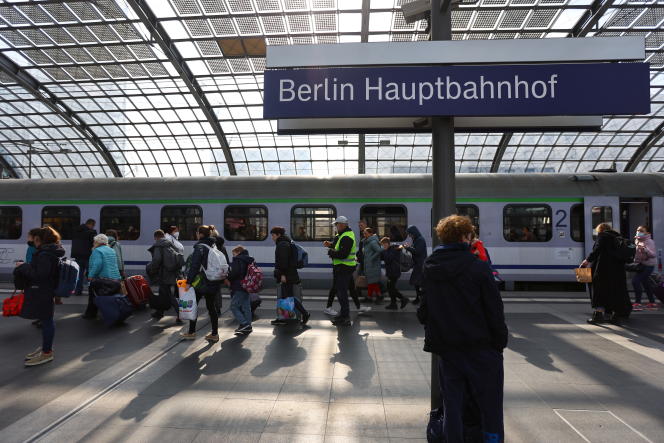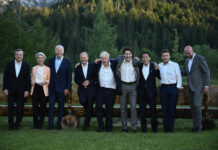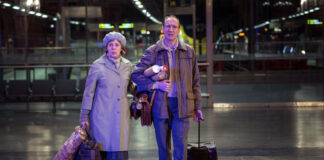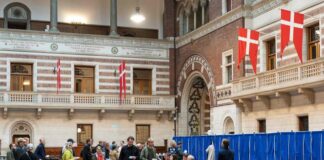I’m in Berlin’s central station, and I’m getting an orange vest. The yellow vests signal volunteers welcoming women, children and men fleeing the war in Ukraine and arriving here in often armored trains, from Poland, the Czech Republic or Hungary. Orange vests are reserved for Ukrainian or Russian speakers. I write my name and my language combination in marker on my vest, before putting it on my winter coat. We are in March 2022, spring is punctual, it is the only thing that is not out of order this year. One season gives way to the next; the sun illuminates the streets where Slavic languages now resonate around every corner, on the sidewalks and at bus stops; the nights remain cold.
In the station, a swarm of volunteers are busy. I want to think that we are like birds; but not the graceful ones that migrate in swarms to other lands. We are more like pigeons, glued to the bitumen and the cold ground of the stations, resuming our erratic ballet every day in the intermediate floors and bays, between the shops and the platforms. At several places in the station, Ukrainian flags indicate the direction to take, volunteers spread the word, newcomers are briefed every quarter of an hour in front of the McDonald’s, the din of the station is deafening: metallic creaks, cacophony of voices, entrenched cries. Often in small groups, the newcomers meander, try to make their way through the bodies, cluttered with belongings, suitcases, strollers, crutches, pets too. It looks like an entire country is pouring into this station. Drains slowly like a gas pump.
Throughout the platform, stands are installed. Behind a pot with hot borscht, several volunteers are busy. Next door, coffee and tea are served, at the neighboring stands there are sandwiches, pastries or cakes that citizens come to offer. A large square is devoted to hygiene products, also from donations: we pick up nappies, wipes, deodorants, shower gels, tampons and towels. A corner for mothers, where they can isolate themselves to breastfeed or change their child, has also been set up. It sits alongside “LGBTQI” and “People of Color” signs, the latter intended to welcome foreigners residing in Ukraine, including many students from African countries who fled in fear Putin’s invasion and been, according to testimony, often terribly unwelcome in Poland.
The eyes are wide, outlined in black. The fatigue is immense. They and they are perhaps a hundred, gathered on this narrow platform at the exit of the quays, especially women with children of all ages, elderly people too. Some are looking for information to continue their journey, a train connection, a place to recharge a cell phone, a SIM card. Around them, about forty volunteers are busy. Children are often well-behaved and quiet; quiet and absent. Their hands hang from those of their mothers and grandmothers. They don’t run, they don’t shout, they don’t mess around. The shock is pregnant. Some, rarer, are on the contrary hyperactive. They do not listen to their exhausted mothers, threaten their neighbors with a plastic plane, a crumpled paper, a nothing transformed into a weapon. They are very excited, impossible to calm down. The atmosphere is electric.
I am told to post myself in the square devoted to hygiene products, where many women flock, but also young teenagers. I hand out deodorant and sanitary napkins. Women ask for makeup remover and face cream. We have some. While the choice of products available is rather extensive, I am also asked for a shower gel with the best scent, an extra-gentle after-shave or cleansing foam for acne-prone skin. I react with exasperation at first, then change my mind. What seems trivial can become essential when it is all that is left. We would like the refugees to be content with what we give them. They saw their world die before their eyes. They have good reasons to want more. They want us to do better. And it starts with better shower gels.
By donning an orange or yellow vest, we leave our social identities at the entrance to the station. Before the war, I was a writer and literary translator. Now I am a volunteer. I meet lawyers, unemployed people, students, scientists, educators, activists, salespeople, people who work in banks. In Ukraine, most of those who did not go to the front have become volunteers, writes a friend who remained there. They teach children, contact psychologists, alert the media, raise funds for hospitals, clear rubble, help rebuild, take care of soldiers… In Lviv and throughout western Ukraine, a bit like in Berlin, but on a much larger scale, they welcome displaced people. “Now, the whole country is volunteering…” A Ukrainian friend living in Germany tells me that he quit his job to help refugees. Putin’s war had the effect of an economic putsch. Volunteerism has replaced the market economy.
Over the next few days, I return to the Hauptbahnhof. The city of Berlin has set up a large tent behind the station, the signage is not obvious, I am mistaken before discovering it. Following rumors of human trafficking, the stands at the station are urgently dismantled. The state wants to take over the reception of refugees. The lovingly prepared soups that smoldered on the platform are replaced by XS-size sandwiches. But a sanitary tent and medical caregivers are on site. The reception is becoming more professional. Out of curiosity, I signed up as a volunteer for the city. I turn in circles in the tent. My assigned coordinator, wearing a purple jacket like me, can’t answer any of my questions other than, “No idea, I’m just in charge of volunteers.” Nobody knows anything. The situation is grotesque. It is not yet possible for refugees to officially register in Berlin. But we already know that the city is saturated. I see myself replying to several people: “You are two million people who have arrived overnight. We are doing our best. »
In the absence of concrete answers, I give the only thing possible: human connection. I improvise, answer questions in my soul and conscience, get to know each other. Three women come towards me. They have already slept in Berlin the day before and do not want to stay another night. There is the mother, the daughter, the grandmother: a real Russian doll. The interlocking of generations and their great gap. The young girl, Katia, 16, a cap over her red hair, ultra-connected to her phone, she sighs with a look of shame when her mother, Svetlana, a blonde and dolled up forty-something, makes condescending remarks about Roma families, who also come from Ukraine. Xenophobia and discrimination of minorities were part of the mentality of people from the Soviet Union, they are taboo for the young pro-European generation. The grandmother, Olga, a teacher of Russian literature with a sophisticated vocabulary, who quotes the Russian playwright Chekhov as well as the Ukrainian poet Taras Shevchenko, twists her head between her hands. I accompany them to take the train to a small German town, where distant acquaintances await them. I carry the bags, ask for the ticket at the counter, lead them to the platform. I help them as much as I help myself. I dress my own dismay.
We are instructed to direct newcomers to buses. They are supposed to go to a temporary accommodation center, set up in the old clinic where drug addicts were treated. Elderly women return in distress from the accommodation allocated to them. Housed in hotels without further explanation, they do not know where to find food, how long they will stay there, or what to do next. Women from Kharkiv show me pictures of their city. We look at the collapsed buildings, with amazement. After a few seconds of meditation, they sigh and sweep the images with a gesture of the hand, as if to say “It’s over, nothing more to say, let’s not talk about it anymore”. The past is past, the present is a hypothesis.
Three weeks ago, Margarita and her daughter, Louba, were living normally. They ate breakfast in the morning, went to the hospital, where Margarita worked as a nurse, and to high school respectively. For the past two years, during the Covid, Tania had worked non-stop. Then life fell apart overnight. A month earlier, they would never have imagined landing in Germany to start a new life there. In early March, disbelief still prevailed among many refugees. A generalized state of shock. Valera, an elderly woman with a tuft of curly hair on her head and a sky blue coat, who is traveling with her teenage grandson, refuses to walk the hundred meters that separates her from the hotel where they are staying. The next day, they must take the train to Paris at dawn. She is afraid of not finding the way. His whole body says no. She falls into my arms. Sobs jerky with tremors. His son remained there, he is at the front. I hug her. That’s all I can do. Attempt to accommodate distress. The sky fell on your head.
I fall asleep guiding a Ukrainian friend crossing the Polish border, wake up sending Telegram messages to accommodate a young woman from kyiv I met the day before. The urgency of the station stresses me out. I decide to use my energy elsewhere and register as a volunteer in a free shop in Berlin, where newcomers can find humanitarian aid, food, hygiene products, clothes. Within this association, I mainly meet young Syrians, who arrived in previous years, who are now welcoming Ukrainians. The mood is good, the pace of work intense. At the entrance to the place, a man in a wheelchair prepares tea and coffee with a tireless smile.
An old man from kyiv walks through the gate. Eyes of a resplendent blue, the skin on the bones. Leaving only with the clothes he had on him, he needs to find pants, shoes, a jacket, shirts. Sitting on a stool to try on sneakers – he refuses the leather moccasins I offer him – he asks me to come over and asks me in a whisper, all pale with embarrassment, if he will also find underwear on our shelves . He left with nothing. At the time of the German Democratic Republic (GDR), he had been part of the troops of the Russian army stationed not far from Berlin, he says. Who could have imagined that he would find himself here again, at the end of his life, fleeing the Russian bombardments? The reality is so grotesque that any science fiction writer would have found it implausible. Most of the clothes we have in stock displease him. But a black leather jacket seduces him. She gives him a hell of a look. Rogue winks. When he was younger, he had the same. He had sewn a map of Europe on the inside pocket, he shows. Now he is the one in the heart of Europe, in rags. This tragic irony reminds me of the incipit of a play by Heiner Müller [1929-1995].
I leave the station by crossing the place of flashy Europe, built a few years ago. I turn my back on the Reichstag and the Bundestag, enter a small park; to my right, camps rise, similar to the migrant camps that line the banks of the Seine in Paris. “I was Hamlet. I stood on the shore and I spoke with the surf BLABLA, in the back the ruins of Europe. Heiner Müller’s words run through my head.
Since the Russian invasion of Ukraine on February 24, literature has stopped speaking to me. The war made me switch to another reality. Sitting at my table to write seems to me as futile as it is impossible. I throw myself headlong into the action. Without knowing which action would be more useful than the other. While experiencing, with each action, my powerlessness to stop this war. “What good are poets in times of trouble? asked Friedrich Hölderlin [1770-1843]. Should I become a soldier in this war, on the humanitarian front of welcoming refugees, stand up on the political front, put pressure on governments to stop importing Russian gas and oil, ask for a stop to Russian propaganda channels in Switzerland, demonstrating every day…? Should I return to my desk to attempt to witness, write down this truly staggering time – while still possible?
These dilemmas pale in comparison to those facing my Ukrainian and Russian friends today. And yet, the poet Hölderlin and the playwright Heiner Müller also had to formulate the same type of questions. What bridges between action in reality and literary testimony? Soon, the conflicts between humanitarian actors and activists exhausted me. Power structures appear to me in their bare reality. Steadfast cages of steel, erected for the comfort of the powerful. Faced with the urgency of the situation, the culture of political compromise seems crude to me. I decide to return to writing. It remains the only place where radicality and nuance are compatible.

















